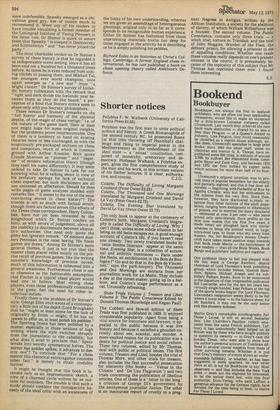Bookend
Bookbuyer
Bookbuyer, not always the first to applaud publishers, who are often too busy applauding themselves, would like to make an exception for a little-known Leicester company called Ulverscroft. Last month they achieved the rare book trade distinction — shared by no less a firm than Penguin — of a Queen's Award to Industry. Like Penguin, they could reasonably be classified as a reprint house although, unlike them, Ulverscroft specialise in large print books; since 1964 the small staff, under its chairman and mentor G. A. Thorpe, have republished some 600 titles, in editions of around 2,500, by authors like Hammond Innes, Georgette Heyer and Zane Grey, and between 1970 and 19/2 the firm trebled its export sales which account for more than half of its business.
Ulverscroft's original intention was to provide texts of popular bestsellers for the elderly and partially sighted, and this it has done admirably — beginning with Pocketful of Rye by Agatha Christie, who lent her enthusiasm to the scheme from the very first. Since then, however, they have discovered a ready response from other factions of the adult population, ranging from immigrants to inhabitants of prisons, not to mention the many thousand — estimated at over 3 per cent — who leave school only semi-literate. Such profits as the firm now makes (for the first five years it made none) are ploughed back into similar schemes to bring the printed word, in large, extra-bold type, to those who shy away from 9-point. No, for Bookbuyer's money Ulverscroft have taken more positive steps towards that book trade Mecca — the recruitment of new readers — than all the Book Weeks, Book Bangs and publishers' ballyhoo put together.
One publisher likely to feel less pleased with life this week is George Rainbird, deputy chairman of Lord Thomson's book publishing group, which includes Nelson, Hamish Hamilton, Sphere, Michael Joseph and its subsidiary Pelham Books. Soon to be announced is the departure of that irrepressible enthusiast Bill Luscombe, who for the last ten years has, virtually single-handed, kept Pelham at the top of the sports books league. For Lord Thomson, Luscombe's resignation seems likely to be felt where it hurts most — in the balance sheet; for Mr Rainbird, it may not be the only senior exit this showery summer.
Martin Gray's remarkable autobiography, Poi. Those I Loved, is still on several bestseller lists. Like Charriere's Papillon (which emanated from the same French publishers, Laffont) it has undoubtedly been helped on its British way by those who have sought publicly to question its veracity — in Gray's case the Sunday Times, who were able to show how the author's personal account of Treblinka differed in several crucial respects from those of other surviving inmates. Whether it is just that Gray's memory of events shows an understandable fallibility, or whether, as has been suggested in some quarters, he was never there at all, is not for Bookbuyer to say. Most observers — and that includes the New York press — seem not the slightest bit interested, so let the matter there rest, with this final postscript: Econ-Verlag, who paid Laffont a generous advance for the German rights, have decided, for the time being at least, to shelve For Those I Loved.


































 Previous page
Previous page